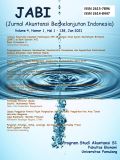Pengaruh Good Corporate Governance, Persistensi Laba dan Earning Growth terhadap Kualitas Laba
DOI:
https://doi.org/10.32493/JABI.v1i1.y2022.p73-88Keywords:
Kualitas Laba, Earning Response Coefficient, Good Corporate Governance, Persistensi Laba, Pertumbuhan labaAbstract
The purpose of this study was to determine the effect of good corporate governance, earnings persistence and earning growth on earnings quality. This study uses a sample of property, real estate and building construction companies listed on the Indonesia Stock Exchange during the 2015-2019 period. The data used in this research is secondary data. The data obtained and collected are then processed using the Eviews 11 application. The results of this study are jointly independent variables consisting of managerial ownership, institutional ownership, independent board of commissioners, audit committee, earnings persistence and earning growth affect earnings quality. Partially independent board of commissioners affect earnings quality, while managerial ownership, institutional ownership, audit committee, earnings persistence and earning growth have no effect on earnings quality.
References
Aini, N., Harianto, R., & Ramadhany, F. (2019). Good Corporate Governance And Intelectual Capital Determinant Earnings Response Coefficient. Icblp Doi 10.4108/Eai.13-2-2019.2286158.
Arisonda, R. (2018). Pengaruh Struktur Modal, Likuiditas, Pertumbuhan Laba, Ukuran Perusahaan dan Invesment Opportunity Set (Ios) Terhadap Kualitas Laba. Advance Vol.5 No.2 Issn 2337 - 5221.
Aristawati, N. M., & Rasmini, N. K. (2018). Pengaruh Konservatisme Akuntansi, Good Corporate Governance dan Pertumbuhan Perusahaan Pada Earnings Response Coefficient. EJurnal Akuntansi Universitas Udayana Vol.24.2 Issn: 2302-8556, 1503-1529.
Dewi Christhina, M. V., & Rahayu, S. (2018). Pengaruh Ukuran Perusahaan, Struktur Modal Dan persistensi Laba Terhadap Earnings Respons coefficient. EProceeding Of Management : Vol.5, No.3 Issn : 2355-9357.
Fitriana, L., & Andayani. (2016). Pengaruh Corporate Social Responsibility, Persistensi Laba Dan Leverage Terhadap Earning Response Coefficient. Jurnal Ilmu Dan Riset Akuntansi : Volume 5, Nomor 5, Issn : 2460-0585.
Irawati, W. (2018). The Effect of Free Cash Flow, Size, and Growth with Profitability as Moderating Variable on Earning Response Coefficient in Property Sector. EAJ (Economic and Accounting Journal), 1(1), 76-86.
Kurnia, I., Diana, N., & Mawardi, M. (2019). Pengaruh Pengungkapan Corporate Social Responsibility, Good Corporate Governance, Ukuran Perusahaan dan Profitabilitas Terhadap Earning Response Coefficient. E-Jra Vol. 08 No. 01 .
Lestari, A., & Oktavianna, R. (2020). Analisis Laba Akuntansi Dan Laba Tunai Terhadap Dividen Kas Pada Perusahaan Farmasi Tahun 2013-2017. EkoPreneur, 1(2), 169-184.
Mutiara, P. (2017). Pengaruh Corporate Governance Dan Pengungkapan CSRTerhadap Earning Response Coefficient (Perusahaan Manufaktur Tahun 2015). Forum Keuangan Dan Bisnis Indonesia (Fkbi), 6 Isbn 978602-17225-7-2, 95-116.
Nadirsyah, & Muharram, N. F. (2015). Struktur Modal, Good Corporate Governance Dan Kualitas Laba. Jurnal Dinamika Akuntansi Dan Bisnis Jdab Vol. 2 (2), , Pp. 184-198.
Nataliantari, N. W., Agungsuaryana, I. N., Ratnadi, N. D., & Astika, I. P. (2020). The Effect Of The Component Of Good Corporate Governance, Leverage, And Firm Size In The Earnings Response Coefficient. American Journal Of Humanities And Social Sciences Research (Ajhssr) E-Issn:2378-703x .
Nathalie. (2019). Income Smoothing Sebagai Pemoderasi Pengaruh Profitabilitas, Leverage, Pesistensi Laba, Growth Terhadap Earning Response Coefficient (Erc). Seminar Nasional Cendekiawan Ke 5 Issn (P) : 2460 - 8696 ; Buku 2: â€Sosial dan Humaniora“ Issn (E) : 2540 - 7589.
Novieyanti , I. A., & Kurnia. (2016). Pengaruh Mekanisme Good Corporate Governance Terhadap Kualitas Laba Pada Perusahaan Manufaktur. Jurnal Ilmu Dan Riset Akuntansi : Volume 5, Nomor 11 Issn : 2460-0585.
Oktavianna, R., & Prasetya, E. R. (2021). Analisis Manajemen Laba yang Dipengaruhi oleh Komite Audit dan Firm Size Perusahaan LQ 45 Tahun 2015-2019. Jurnal Ilmiah Akuntansi Universitas Pamulang, 9(1), 54-64.
Puspitowati, N. I., & Mulya, A. A. (2014). Pengaruh Ukuran Komite Audit, Ukuran Dewan Komisaris, Kepemilikan Manajerial, Dan Kepemilikan Institusional Terhadap Kualitas Laba. Jurnal Akuntansi Dan Keuangan Fe Universitas Budi Luhur Vol. 3 No. 1 Issn: 2252 7141.
Ratnasari, D., Th, E. S., & Sofianty, D. (2017). Pengaruh Persistensi Laba,Ukuran Perusahaan Dan Default Risk Terhadap Earnings Response Coefficient. Prosidik Akuntansi Issn : 2460-6561.
Rizqi, A., Murdayanti, Y., & Utaminingtyas, T. H. (2020). Pengaruh Persistensi Laba, Kesempatan Bertumbuh Dan Income Smoothing Terhadap Kualitas Laba. Jurnal Akuntansi, Perpajakan Dan Auditing, Vol. 1, No. 1, 97108.
Sutoyo, & Wulandari, A. I. (2017). Leverage, Peningkatan Laba, Peluang Pertumbuhan Dan Risiko Sistematis Dan Koefisien Respon Laba. Buletin Ekonomi Vol.15, No. 2, 155-303 .
Syafrizal, Sugiyanto, & Kartolo, R. (2020). Effect Struktur Modal Dan Alokasi Pajak Antar Periode Dan Persistensi Laba Terhadap Kualitas Laba Dengan Moderating Size. Prosiding Seminar Nasional Humani.
Wulandari, I. T., & Herkulanus, B. S. (2015). Konservatisme Akuntansi, Good Corporate Governance dan Pengungkapan Corporate Social Responsibility Pada Earnings Response Coefficient. E-Jurnal Akuntansi Universitas Udayana 13.1 Issn: 30221039, 173-190
Downloads
Published
Issue
Section
License
Authors who publish with this journal agree to the following terms:
- Authors retain copyright and grant the journal right of first publication with the work simultaneously licensed under a Creative Commons Attribution License that allows others to share the work with an acknowledgement of the work's authorship and initial publication in this journal.
- Authors are able to enter into separate, additional contractual arrangements for the non-exclusive distribution of the journal's published version of the work (e.g., post it to an institutional repository or publish it in a book), with an acknowledgement of its initial publication in this journal.
- Authors are permitted and encouraged to post their work online (e.g., in institutional repositories or on their website) prior to and during the submission process, as it can lead to productive exchanges, as well as earlier and greater citation of published work (See The Effect of Open Access)

This work is licensed under a Creative Commons Attribution-ShareAlike 4.0 International License.


 PUBLICATION ETHICS
PUBLICATION ETHICS FOCUS AND SCOPE
FOCUS AND SCOPE EDITORIAL TEAM
EDITORIAL TEAM REVIEW PROCESS
REVIEW PROCESS CONTACT US
CONTACT US AUTHOR GUIDELINES
AUTHOR GUIDELINES




